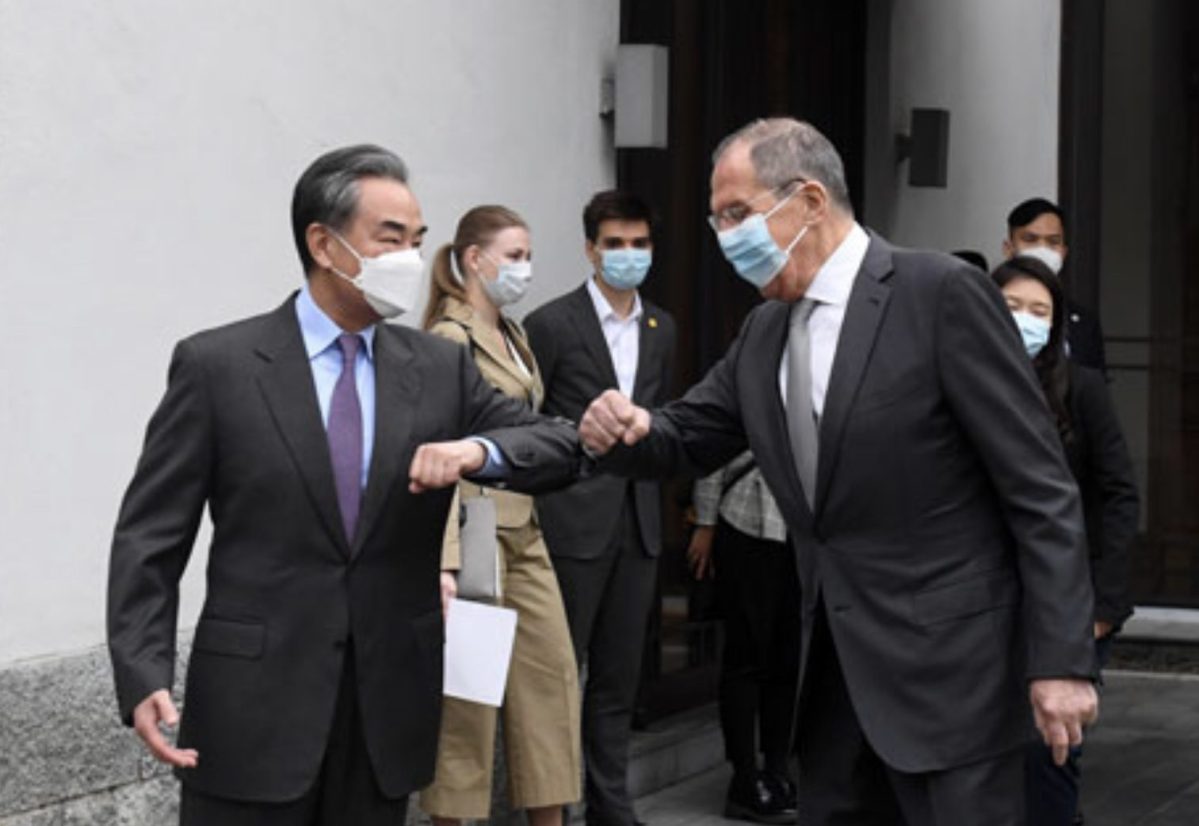[ad_1]
Having bid good riddance to the cold of Anchorage and the frosty reception by United States Secretary of State Anthony Blinken, Chinese Foreign Minister Wang Yi has just enjoyed the balmy weather with his Russian counterpart Sergey Lavrov in the Chinese resort city of Guilin. Â
Friendship was in the air when Wang and Lavrov bumped elbows in front of a media scrum on Monday. There was no such light occasion when senior Chinese and American diplomats met in Alaska.
In Beijing, Chinese Foreign Ministry spokeswoman Hua Chunying echoed her Russian counterpart Maria Zakharova’s take of the bromance between the neighbors. Hua said Beijing and Moscow would stand shoulder by shoulder against Washington’s “hegemonic bullying†and sanctions and defend global peace and justice.Â
“The more tumultuous the world becomes, the more China and Russia are set upon cementing ties and furthering cooperation to counter the predations of the US-led West,†said Hua. Lavrov said ties with China were at their best.Â
Lavrov is among the few foreign dignitaries who have been spared quarantine since the Covid-19 outbreak. He reportedly spent hours with Wang on a river cruise against the backdrop of karst mountains, followed by talks on Tuesday.Â
Both sides reached a broad consensus on their approaches to the US, a circular from the Chinese Foreign Ministry said. They nudged Washington to reflect on its excesses and unilateralism over the years that had usurped other countries’ politics and led to cliques and factions of the international community that fermented tensions of “bloc confrontation.â€
Both sides also talked up ideals of cohesion and shared prosperity by countries with dissimilarities in ideologies, and said countries with competing social and political systems should still find common ground.
The talks in Guilin also encompassed issues including climate change, United Nations reforms as well as an appraisal of Asia-Pacific affairs. In another swipe at the US, the two sides are expected to issue a joint statement on global governance to help countries come to grips with the multiple challenges facing the world.Â
The Biden administration’s salvo of sanctions this month against Chinese and Russian officials over the perceived strangling of democracy in Hong Kong and human rights abuses in Xinjiang as well as Moscow’s treatment of dissidents and US election-meddling have helped both powers close ranks against America.
“An enemy’s enemy is a friend,†said a post on the online forum of Beijing mouthpiece the People’s Daily, where a constant drumbeat to form a united front against the US reverberates in nationalist posts and threads. Such voices are rising after Chinese expectations of a thaw in ties with a new tenant in the White House have failed to materialize. Â
The renewed camaraderie again fueled talk among observers and netizens in China about Beijing and Moscow forging an alliance, yet some analysts say Beijing is not in a rush to be in an anti-US political, economic and military wedlock with Moscow.Â
While hailing Beijing’s bromance with Moscow as a paragon of diplomatic virtues, Hua said treaties between the two, including a landmark one about friendship and cooperation signed by Jiang Zemin and Boris Yeltsin that turns 20 this year, would never pit the pair against any third country.  Â
Ji Zhiye, former dean of the semiofficial China Institutes of Contemporary International Relations, wrote on his blog that the timing of Lavrov’s China visit was a “coincidence†as it had been scheduled well before the Alaska talks.
He said Beijing and Moscow traditionally would host frequent exchanges each spring for routine strategic dialogues and that some observers may have read too much into this year’s event.Â
“Forming such an avowed alliance [with Moscow] would be the beginning of a new Cold War but what Beijing has been purveying all along is pluralism and multi-polarizationâ€, Ji said.
“A new Cold War would do a serious disservice to Beijing’s core interests spread across the world. It would really mean something if Vladimir Putin comes to China again or Xi Jinping goes to Russia, but such a top-level summit is not going to happen soon.â€Â
“Of course both sides will not falter in their resolve to carry out existing exchanges and programs and will give each other unfailing support since the rapport is strong. But a total falling-out with the US is the last thing Beijing wants.â€
One sign of Beijing’s prudence is its far from enthusiastic response to Lavrov’s proposals to evade sanctions by settling international trade and payments using currencies other than the US greenback.Â
There are other Chinese netizens who are skeptical about how staunch Russia’s backing would be in a time of crisis.Â
“Sell China more S-400 missiles or share with China the core technologies of wide-body jets, advanced stealth fighters and nuclear submarines, if Russia is a genuine friend that we can trust and who will reciprocate our goodwill,†said one post on Weibo.
“When the state media says trust in each other has never wavered but we are seeing Putin selling S-400s to India after the Tibetan border skirmishes and the CR929 project for the co-development of a long-range airliner is stalled.†Â
Zhu Feng, an international relations professor with Nanjing University, said that with Donald Trump gone, Moscow may need Beijing more than before.Â
“Moscow’s pull in US politics is weakened in the Joe Biden era and indeed its US ties are hitting a low point after Putin recalled Russia’s ambassador to Washington.Â
“The Biden administration in its first 100 days had heaped far more pressure on Moscow than Trump did in the past four years and the Kremlin, risking being frozen out of the new world order when the US re-emerges on the global stage, may have not too many viable strategic options other than keeping up ties with Beijing,†Zhu said.Â
[ad_2]
Source link













